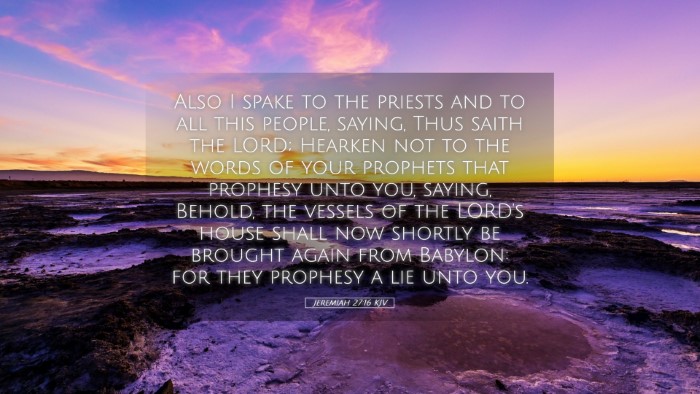Commentary on Jeremiah 27:16
Verse Context: Jeremiah 27:16 states, “Also I spake to the priests and to all this people, saying, Thus saith the Lord; Hearken not to the words of your prophets that prophesy unto you, saying, Behold, the vessels of the Lord's house shall now shortly be brought again from Babylon: for they prophesy a lie unto you.” This verse comes during a significant period in Israel's history, during the Babylonian exile, and highlights the opposition between true prophecy of Jeremiah and the false prophets of his time.
Overview and Significance
This verse is crucial as it emphasizes the distinction between the genuine message from God and the misleading assurances provided by false prophets. Jeremiah, being a true prophet, conveyed a message of judgment and impending exile, while the false prophets offered a more pleasant but deceiving narrative. The larger context encompasses God’s sovereignty over nations and the call for Israel to accept their situation as part of His divine plan.
Insights from Public Domain Commentaries
Matthew Henry's Commentary
Matthew Henry emphasizes the importance of discernment in spiritual matters, especially pertaining to the prophecies that people accept or reject. He notes, “The false prophets assured the people of an early return of the sacred vessels, contradicting the word of the Lord by His prophet Jeremiah.” Henry warns of the dangers of listening to messages that appeal to the emotions but do not align with God’s revealed truth, highlighting that the people of Israel were prone to believe lies that offered immediate relief to their distress.
Henry further explains that the “vessels of the Lord's house” signify the sacred articles of the temple, which were taken to Babylon. The false hope held by the people is contrasted with the grim reality laid out by Jeremiah. He is called to expose their falsehood and encourage the people to endure their circumstances as divine discipline.
Albert Barnes' Notes
Albert Barnes brings a scholarly perspective to the text, elucidating the implications behind Jeremiah’s warning. He posits that the assurance of the restoration of the temple vessels was both a comforting and misleading message that detracted from the need for genuine repentance and faithfulness to God. Barnes highlights that the phrase “Hearken not to the words of your prophets” is a direct and strong command against the falsehoods leading the people astray.
He notes that these false prophecies often flourished in times of national distress and were aimed at averting the fear of exile. Barnes stresses this verse's relevance by applying it to contemporary expectations of spiritual leaders, urging both pastors and laity to be vigilant against cualquier ambiguities in prophetic utterances that do not seriously reckon the challenges of a faithful walk with God.
Adam Clarke's Commentary
Adam Clarke adds a more detailed historical context. He elucidates that this period was marked by deep political turmoil and uncertainty for Judah. His view suggests that the false prophets were motivated either by a desire to gain favor or out of sheer ignorance of God's will. Clarke asserts that the insistence on returning the vessels signifies a broader hope for restoration without the necessary conditions of repentance.
He addresses the role of the prophets in society, underscoring that a true prophet is compelled to speak God’s truth, regardless of how unpopular or painful that truth may be. Clarke’s commentary serves as a reminder that genuine faith often requires embracing difficult truths in the light of God's character and promises. He encourages readers to recognize that enduring their situation under God's sovereignty would ultimately yield a greater understanding of His faithfulness.
Theological Implications
The implications of Jeremiah 27:16 extend beyond its immediate historical setting, reflecting core theological tenets relevant for today’s faithful. The tension between true and false prophecy is a recurring theme in the scriptures, emphasizing that believers must cling to scriptural truths, especially in tumultuous times. The remnant of Israel was called to trust in God’s plan rather than seeking comfort from flattering messages.
- Discernment: The need for spiritual discernment remains constant. Modern readers are encouraged to test all teachings against Scripture.
- Faithfulness in Adversity: Just as Jeremiah urged the Israelites to accept their circumstances, believers today are reminded to trust God amidst trials.
- God's Sovereignty: The overarching theme is God’s control over the nations and His ultimate purpose, reinforcing the need for submission to His will.
Practical Applications
In light of this commentary, pastors and scholars might consider the following applications:
- Teaching Authenticity: Encourage congregations to seek biblical authenticity over popular sentiments in sermons and teachings.
- Call to Repentance: Emphasize the need for genuine repentance in personal and community life, rather than a mere desire for quick relief.
- Encourage Questioning: Foster a culture where questioning and wrestling with difficult truths is seen as a part of spiritual growth.
Conclusion
Jeremiah 27:16 offers profound insights into the nature of prophecy, the importance of discernment, and the necessity of aligning with God's will, rather than succumbing to the seductive nature of false claims. As we engage with this text, let it inspire a deeper commitment to seek God's truth boldly, addressing ourselves and our communities with the seriousness called for by the faithful words of Scripture.


